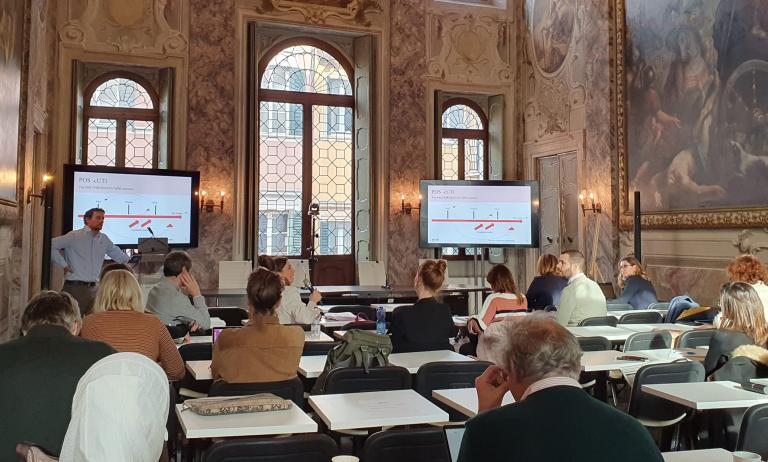The ECRAID-Base consortium touched base in Verona
The historic Italian city of Verona was the backdrop for the ECRAID-Base consortium’s second face-to-face meeting. In contrast to the General Assembly in Antwerp in the summer, this series of working meetings involved a smaller group of partner representatives.
Participants converged on Palazzo Paletta dai Prè, a beautiful historical building in downtown Verona, on 30 November and 1 December 2022. The venue was generously provided by Ecraid’s Italian partner, the University of Verona.

During two operational working meetings of the teams leading the project’s Perpetual Observational Studies (POS), project managers Lina Gurskaite and Marijke Koopmans helped the POS teams to align their work in a way that optimises operational activities, for example protocols, site selection, patient inclusions and regulatory issues. They focused on sharing information and solving problems together as many of the challenges faced by the teams are similar.
ECRAID-Base Project Manager Rachel Vijlbrief also addressed the teams. She presented the grant management progress and reiterated the importance of working closely together to reach the desired milestones and deliverables.
Some of the teams took advantage of the opportunity to meet and align their efforts in person. The Laboratory and Data teams met to discuss data and sample storage and use. Individual study representatives, too, discussed outstanding issues with colleagues from other parts of the project.
Additionally, the Ecraid Coordinating Committee held a hybrid meeting in Verona with its members joining in from across the continent.
About ECRAID-Base
The EU-funded ECRAID-Base project delivers the initial set of activities for Ecraid. Over the five-year duration of the project, Ecraid will evolve into a self-sustainable not-for-profit organisation aiming to improve clinical research in the field of infectious diseases in Europe.
At the core of ECRAID-Base is the unification of several networks into one centralised sustainable network that shares resources, data and expertise to tackle the most urgent infectious diseases threats. Its infrastructure – built within the EU-funded projects COMBACTE and PREPARE – facilitates faster, easier and more cost-effective clinical research. The first studies to benefit from this unified infrastructure are five Perpetual Observational Studies (POS). All of these will mature towards adaptive platform trials with the capability to rapidly respond to public health threats.